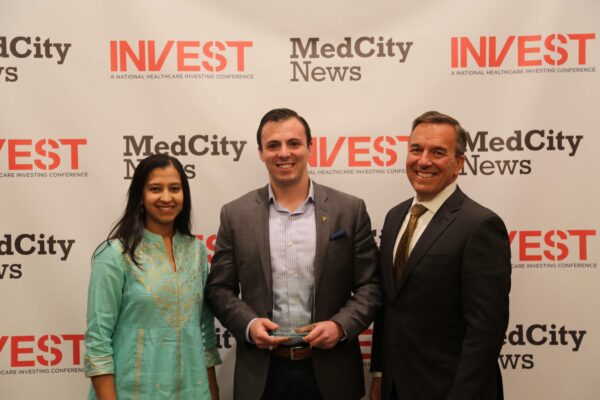
From left: MedCity News editor-in-chief Arundhati Parmar; NeuroFlow CEO Chris Molaro; and MHIN president Dennis Depenbusch
The healthcare industry is recognizing the connection between mental health and physical health, as well as how much a patient’s behavioral health needs impact his or her journey across the care continuum.
NeuroFlow, a startup based in Philadelphia, seeks to address this issue by promoting behavioral health access in a variety of care settings. The company recently won the health IT track of the Pitch Perfect contest at MedCity’s INVEST conference in Chicago.
Its approach involves IT platforms for different groups:
- EngageBH is for behavioral health specialists. The tool lets them administer questionnaires to patients, track assignments and stream data from wearables to NeuroFlow’s analytics engine.
- The IntegrateHealth platform enables organizations to incorporate behavioral health into primary care, pain management and other clinical areas.
- Empower is a solution for payers and employers. The population health management platform allows entities to provide mental wellness resources to members.
For patients, NeuroFlow has a mobile app that lets users write in a journal, track their stress, track their mood and sleep, learn breathing techniques, track their heart rate and more. To use the app, patients must be invited by their provider.
“I think … we’re becoming smarter on the importance of mental health and the effects it has on everything else,” co-founder and CEO Chris Molaro said of the healthcare industry in a phone interview.

A Deep-dive Into Specialty Pharma
A specialty drug is a class of prescription medications used to treat complex, chronic or rare medical conditions. Although this classification was originally intended to define the treatment of rare, also termed “orphan” diseases, affecting fewer than 200,000 people in the US, more recently, specialty drugs have emerged as the cornerstone of treatment for chronic and complex diseases such as cancer, autoimmune conditions, diabetes, hepatitis C, and HIV/AIDS.
Prior to earning his MBA, Molaro attended West Point and served in the U.S. Army. While in the military, he and his fellow soldiers found it challenging to maintain their mental strength. He realized the significance of integrating behavioral and physical health and how it impacts both veterans and civilians. Molaro later met his co-founder Adam Pardes (who serves as the company’s COO), and the duo went on to create NeuroFlow and its offerings.
Molaro noted that NeuroFlow has recently launched its solution at some hospitals and health plans, though the details of the deals are not public yet. The Philadelphia company has also grown from a team perspective. It had 12 full-time employees in January, and by the end of May, it expects to have 24 full-time staffers.
To date, the startup has raised $3.5 million, Molaro said. That amount, however, does not include non-diluted grant funding from organizations like the National Science Foundation. Through an NSF grant, NeuroFlow is researching the use of its technology at the Corporal Michael J. Crescenz VA Medical Center in Philadelphia.
Although the startup isn’t actively fundraising right now, Molaro said NeuroFlow plans on raising another round at some point in the next year.
Photo: Natalie Bahmanyar













